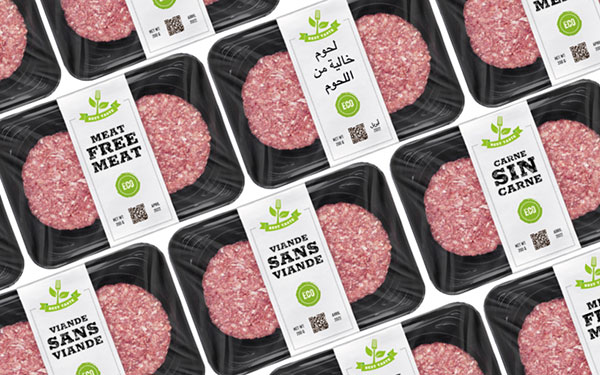Fake meat ‘alternatives’ are not as green as they claim because they are based on industrial methods that drive environmental crises, a new report has found.
The report, by the Independent Panel of Experts on Sustainable Food Systems (IPES–Food) and published last week, warned that alternative proteins that are used in things like plant-based burgers will continue the same problems of industrial food systems; powerful agribusiness corporations, unhealthy diets and long supply chains that exploit farmers.
“It’s easy to see why people would be drawn to the marketing and hype, but fake meat will not save the planet,” said IPES–Food member and lead author Phil Howard.
“In many cases, switching to fake meat will make the problems with our industrial food system worse; fossil fuel dependence, industrial monocultures, pollution, poor work conditions, unhealthy diets, and control by massive corporations.”
Many people are trying to cut their meat consumption as a way of reducing the impact of their diet, aware of things like deforestation driven by demand for animal feed and methane emissions from cows, as well as animal welfare concerns.
But consumers may be inadvertently funding the same agribusiness and meat processing companies that are driving deforestation, as companies like JBS and Cargill have developed plant-based brands and products as they look to make the most of the boom in this market.

“Well-meaning consumers might not know that fake meat is increasingly in the hands of the same giant meat corporations that are linked to the destruction of rainforests,” said Howard.
According to the report, this narrow focus on protein and profit fails to take into consideration the whole picture and is preventing a widespread shift to producing diverse, ecological, nutritious foods that support farmer livelihoods.
The report said food and farming must consider all dimensions of sustainability such as the environment, health, society and culture, rather than a simple switch in protein consumption.
“People say more protein is needed to stop people going hungry, as an excuse to leap on techno-fixes like fake meat,” said co-chair of IPES-Food, and UN special rapporteur on extreme poverty and human rights, Olivier De Schutter.
“But the reality is there’s an excess of protein production globally, these techno-fixes have nothing to offer malnourished people, and hunger must be addressed by improving access to diverse diets for people in poverty,” he added.
The report urged governments to address the concentration of power in agribusiness and alternative protein firms through competition and antitrust laws (regulations that break up and fine dominant firms abusing their power).
Finally, the decisions around the future of food must include the voices of indigenous people, farmers, fishers and those at risk of hunger, groups often excluded in this increasingly polarised debate, the report concluded.
For ideas and recipes on how to make your own plant-based burgers without ultra-processed ingredients click here.















Veganism is not about the companies involved. It’s about the inefficient nature of feeding billions of farm animals just to kill them as babies vs feeding humans directly to live to old age.
I would say that the companies involved are pretty important; more profit for the likes of JBS (biggest global meat processing company) & Cargill (massive agribusiness firm) means more market consolidation & more power. My vision of the food system is in many diverse, responsible farmers, processors, makers, distributors & businesses, rather than a few select corporations that are machines, designed to seek profits and power. I have little confidence that a swap to plant based alternatives will lead to a transformation in our food systems. Change the systsem NOT the product.
Anyone who buys a product to eat that has been manufactured is supporting the company, vegan or not.
The only way I see it to improve things is not to buy processed food. If the planet, or a huge proportion of it stopped eating meat and poultry the animals that now are used to produce our food would all but disappear.
Nobody is going to keep a cow pig or sheep as a pet. Well very few would. I believe in animal welfare very much, so only eat or buy a product that has been cared for. This is the important and responsible thing to do to avoid factory farming, which should be banned.
If anyone wants to eat meat they should have to pay for it.
I have got no problem with anyone who wants to avoid eating meat or fish, but as the big boys always do, they exploit this by manufacturing vegan or vegetarian fast food to make huge profits, with not a care for any environmental fallout.
Eating a burger or sausage etc I see as an interim stage. People who want to reduce or cut out animal products are making a step in the right direction. But as the article says highly processed food like most of this stuff is not good for us whether it contains animals or not. As is rightly said it just supports the profits of big food.
Better to get your protein and micronutrients from things like pulses, vegetables and fruit and nuts etc, packaged as nature intended.
Surely eating sausages and burgers is not making the right decision, as they are likely to be the least responsibly produced meat. The most responsibly sourced meat is quality grass fed beef on permanent pasture. So a smaller amount of real beef from Dartmoor is likely to be much more planet friendly.
Many of the Vegan and vegetarian ready meals in supermarkets are nutritionally deficient and will lead to ill health. Without knowing the source of the ingredients and the manufacturing process we cannot know whether they are environmentally friendly or not.
Similar to the meat ready meals I imagine? Is the notion of convenience mutually exclusive with health perhaps?
Despite this, you can probably be fairly confident that a vegan/veggie-ready meal will be **less** environmentally damaging.